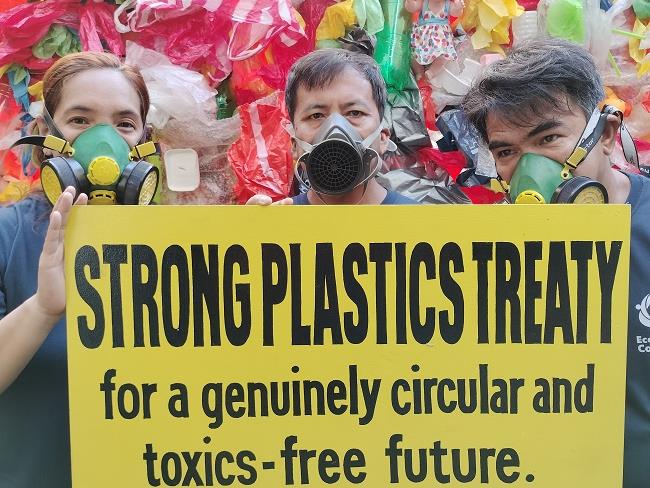Various environmental groups voiced their hopes for an ambitious treaty as governments assembled in Punta del Este, Uruguay, for the first session of the Intergovernmental Negotiating Committee (INC-1) to develop a global legally binding instrument on plastic pollution, including in the marine environment.

The INC-1 is the negotiating body established by the United Nations Environment Assembly to develop the text of a global agreement on plastic pollution. The session holds from November 28 to December 2, 2022.
“We hope that governments will muster the courage and power to negotiate for an ambitious treaty with binding controls and targets to effectively deal with the plastic threats to our people’s health and the environment throughout the lifecycle of plastics,” declared Aileen Lucero, National Coordinator, EcoWaste Coalition.
“INC-1 should lay a strong foundation for real solutions to the planetary plastic pollution crisis, including reducing plastic production, phasing out toxic chemical additives in plastics, banning the recycling of plastics with hazardous chemicals into the economy, advancing zero waste and other non-incineration strategies, and promoting sustainable materials for a toxics-free circular society,” she added, pointing out that “corporations responsible for the toxic plastic mess should be held financially accountable in line with the polluter pays and environmental justice principles.”
Sonia Mendoza, Chairman, Mother Earth Foundation, said: “Negotiators have a crucial task in determining how ambitious or weak the envisaged plastics treaty will be. Together with fellow advocates for zero waste and chemical safety, we urge all governments to rise up to the challenge and ensure that the greater interest of public health and our Mother Earth will prevail over ‘business as usual,’ ‘quick fixes or ‘greenwashing’ during the treaty negotiations. All eyes will be in Punta del Este as the health and future of our planet is at stake, and we hope delegates will not fail us.”
Atty. Gloria Estenzo Ramos, Vice President, Oceana Philippines, said: “We welcome every opportunity to find solutions to end plastic pollution on a global scale. The start of the INC meetings to develop the global legally binding treaty on plastics is an opportunity to bring an alignment towards one common goal, to turn off the tap on plastics. There is no doubt in our minds that one of the biggest challenges we face is plastic leakage into our oceans.
“We need to identify a global pathway to eliminate the transboundary harm of plastics on people and the environment. Everyone needs to be on the same page globally but must also act locally to address the root causes of plastic pollution throughout its lifecycle.”
Marian Ledesma, Zero Waste Campaigner of Greenpeace Philippines, said: “Plastic pollutes and harms throughout its entire lifecycle, from extraction of its raw materials all the way to its post-consumer treatment or disposal. If we truly want to end plastic pollution and the global crisis it has resulted in, we need to drastically reduce production and use. We simply cannot keep up with the vast volumes of plastic produced and the pollution it results into, so we should address this problem at its source.
“The treaty should follow the zero-waste hierarchy – putting reduction and reuse first over band aid solutions like recycling and waste-to-energy. It must enable us to turn off the plastic tap and transition to safe, just and equitable systems that benefit everyone.”
Raphael Lopez, Programme Manager, Health Care Without Harm (HCWH)-Asia, said: “The plastics treaty should support and amplify measures to reduce the impact of unsafe and unsustainable medical products. Bans and restrictions need to have global scope to prevent the migration of dirty technologies and products to parts of the word where controls are less strict, to help overcome barriers to bringing innovative and safer products onto the global market.
“Unless the treaty clearly marks the path to safer and more sustainable plastics, manufacturers, especially smaller ones, will be forced to continue to follow the status quo.”
Chinkie Peliño-Golle, Regional Coordinator of the International Pollutants Elimination Network (IPEN)-Southeast and East Asia, emphasised: “Plastics do not exist without chemicals, and harmful chemicals are released at every phase of the plastics’ lifecycle. Governments should work on eliminating toxic chemicals in the production, use and disposal of plastics.
“There are ways to do that, which include developing sustainability criteria and standards for plastics and ensuring transparency in the value chain, material, and chemical composition of plastics.”
Along with other environmental leaders, she urged all governments “to come up with a strong stance in support of a global plastics treaty that will address both the environmental and public health impacts of plastics.”
Dr Leslie Adogame, Executive Director of SRADev Nigeria, said: “The INC-1 is the gathering that will bring forth the long-awaited global plastic treaty. This is the biggest plastic meeting negotiation, and we are looking forward to a successful outcome.”
